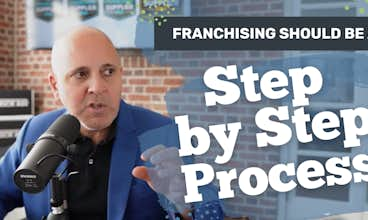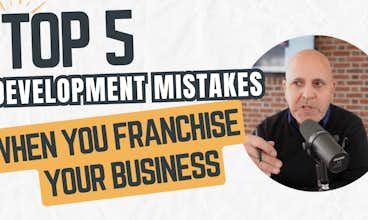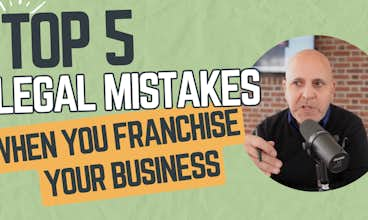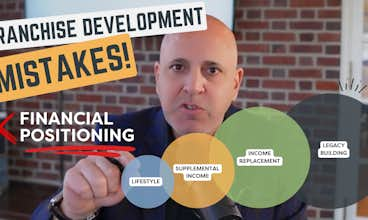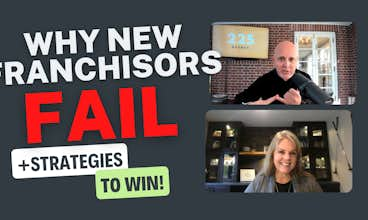What consultants won’t tell you about traps new franchisors can fall victim to.
KEY TAKEAWAYS
Planning, sequencing and strategy are critical for franchise growth.
Even if your sales activity is good, developing a sales strategy can offer advantages for sustainable growth over time.
The franchise industry is heavily regulated, so it’s important to remember that a franchise sales process isn’t a replacement for legal compliance.
Franchise growth is a powerful formula for taking your brand to the next level, but getting the sequence, planning and strategy right is critical for success.
For new and emerging franchisors, it’s important to know how to recognize and avoid traps when growing your brand. From adopting the wrong mindset to developing the wrong sales strategies and working with the wrong franchise consultants, it’s easy to fall victim to the “franchise sales trap” – a cycle of activity that feels like progress even though it isn’t. Sometimes, those cycles can even trick you into thinking you don’t need a franchise sales strategy when you do.
In this guide, we’ll explore the elements of a franchise sales trap and share methods for developing a sales strategy that supports the long-term growth of your business.
The Elements of a Franchise Sales Trap
As a successful business owner entering the franchise space, selling franchises is one of the most important aspects of building a thriving franchise system. Because of that, new franchisors often turn to franchise advisors to help them grow. But while there are plenty of good consultants that can help develop your brand, it’s important to know how to identify the core elements of a franchise sales trap to avoid falling into one.
1. The Trap Itself
Disreputable consultants often market themselves as “one-stop-shops” that handle every aspect of the franchising process for you in-house, including franchise sales. Despite their promises, though, those claims are sometimes too good to be true.
Common promises unscrupulous franchise developers make when cold-calling new and emerging franchisors often include the following:
Done-for-you franchise sales. Some franchise consultants may claim to handle all of your franchise sales needs in-house for a fee, but it’s important to be wary of those who overpromise and underdeliver.
Legal support. Franchise advisors often claim to provide in-house legal support, but some use boilerplate documents or outsource legal work to third parties that can’t offer the customized legal advice new franchisors typically need.
Access to connections. Franchise growth doesn’t happen overnight. While some developers might claim to offer connections to franchise sales organizations or brokers to bring in leads, those promises can fall short.
Instead of relying on others to grow your new franchise system, it’s critical to adopt the right growth mindset during your first two years as a franchisor. Rather than outsourcing franchise sales during that time, consider building your brand’s foundation and growing strategically over several years.
2. Sales Activity vs. Strategy
As an emerging franchisor, it’s important to remember that short-term sales activity isn’t the same as developing a franchise sales strategy that will continue working for your brand over the long run.
While “one-stop-shop” franchise developers might promise to handle franchise sales and marketing in-house, those solutions are often based on generic formulas rather than customized strategies tailored to your franchise system’s goals and progress.
Instead, focus on developing a five-year success strategy centered around your vision for your brand. Plan to spend the first two years building out the following elements of your franchise offering to attract the right candidates to your offering:
Brand story. Building a compelling brand story and sales website can help prospective franchise buyers form an emotional connection to your brand.
Sales process. Developing a strong sales process can help you stay organized, consistent and professional while growing your business.
Networking. New franchisors can benefit from networking with other franchisors and brokers while attending conferences and learning industry best practices.
Organic growth. Growing your brand organically through existing personal networks and loyal customers can contribute to a strong foundation for your business.
Keep in mind that your early franchisees’ validation will set the tone for future franchise sales. By over-supporting your first franchisees, you can boost your unit economics and position your brand to continue growing over time.
3. Sales Process vs. Legal Compliance
The franchise industry is heavily regulated by state and federal franchise laws, and 90% of the franchising process is focused on legal preparation and compliance. Because of that, it’s important to remember that the franchise sales process is not a substitute for legal compliance.
Although franchise consultants often claim to provide in-house legal support for franchisors, many aren’t licensed attorneys. Instead, they sometimes outsource third-party services or utilize boilerplate documents that might not offer sufficient legal protection for your business.
Instead of risking exposure to liability, it’s best to work directly with a qualified franchise attorney to franchise your business. The advantages of hiring an attorney directly include, but aren’t limited to, the following:
Industry expertise. Franchise attorneys know the industry and can identify areas of liability and risk that consultants or general practice lawyers might miss.
Legal documents. A franchise lawyer can ensure that your Franchise Disclosure Document (FDD), franchise agreement and other documents to start a franchise are legally compliant and crafted to limit your liability exposure.
Regulatory compliance. A franchise attorney can ensure compliance wherever your brand operates – even if it’s in a state with complex franchise laws.
Accountability. When you establish a client-attorney relationship, your attorney is accountable to you directly.
By working with a licensed franchise attorney to franchise your business and develop your sales process, you can limit your brand’s exposure to liability while ensuring that your brand has a rock-solid legal foundation, no matter where it operates.
Warning Signs of a Franchise Sales Trap
As a new or emerging franchisor, it’s important to know the warning signs of a franchise sales trap – and how to get out of one after you’ve fallen in.
Some common red flags to watch out for include, but aren’t limited to, the following:
Your sales process is outsourced. A consulting team handles every aspect of your franchise sales process and connects you with candidates at their discretion.
Moving too fast. Running cold ads before your brand story or marketing campaigns are fully fleshed out, or attending expos before your brand is mature enough, can result in wasted time and money.
Form over substance. Activity doesn’t always translate to sales. Attending expos or partnering with FSOs before your brand is ready can be detrimental – and the steep fees can affect your bottom line.
No strategy. Growth shouldn’t be accidental. Having a strategy for developing your brand’s website, sales process, brand positioning, franchisee support, unit economics and more incrementally over time is critical for success.
As an emerging franchisor, it’s important to take a strategic, hands-on approach to franchise sales. Your first several franchisees are pioneering entrepreneurs who deserve your time and support to reach their goals – and their validation is critical for the continued growth of your business.
Instead of outsourcing your franchise sales process, consider taking an active role in growing your brand organically during your first several years in business. By avoiding the franchise sales trap and focusing on long-term strategy, you can build a thriving franchise system that will stand the test of time.
Want to improve your franchise sales process but don’t know where to start? Contact us now!


